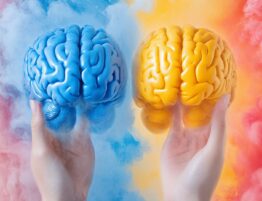Adequate rest is a key aspect of psychological and physical health. The minimum amount of sleep needed for brain function varies by age. This is essential across the lifespan. The brain consolidates memories. Also, it processes information during sleep. The human brain clears out toxins. They are generally accumulated during waking hours. Insufficient sleep has been linked to a range of neurological issues. They are impaired cognition, memory problems, and mood disturbances. Chronic sleep deprivation may increase the risk of developing neurodegenerative diseases.
Understanding how to wake up your brain function when you wake up is important. Recent research underscores the intricate relationship between sleep and brain health. Relaxation allows neurons to repair and rejuvenate. It facilitates efficient communication between brain regions. Adequate sleeping also supports emotional regulation and decision-making processes. Conversely, disruptions in its patterns can lead to cognitive decline. They may exacerbate existing neurological conditions. Here are some essential tips to help you.
Understanding the Science of Sleep
Understanding the science of sleep helps us grasp its profound impact on overall health and cognitive function. Sleep is a complex biological process. It involves distinct severe stages. They are crucial for physical and mental restoration.
The Sleep Cycle Explained
Many people wonder why they’re not getting enough deep sleep. This aspect consists of several stages. They repeat throughout the night in roughly 90-minute intervals:
- Stage 1: Transition from wakefulness to sleep.
- Stage 2: Brain waves slow, and body temperature drops.
- Stages 3 and 4: Delta waves dominate. They are crucial for physical restoration and growth hormone release.
- REM (Rapid Eye Movement) Sleep: Brain activity increases. This is generally associated with dreaming and memory consolidation.
The Nervous System and Sleep
The brain regulates sleep-wake cycles. They are through a complex interaction of neurotransmitters and hormones. Will your brain eat itself if you don’t get enough sleep? Its deprivation can lead to increased activity of microglial cells. These are responsible for clearing debris and maintaining brain health. Prolonged lack of sleep may contribute to neuroinflammation. This may lead to impaired cognitive function. Among the sleep-disrupting factors are:
- Stress and Anxiety: Heightened arousal levels can interfere with entering deep sleep stages.
- Sleep Disorders: Conditions like apnea or restless legs syndrome disrupt sleep architecture.
- Medications: Certain drugs can affect sleep patterns.
- Lifestyle Factors: Irregular sleep schedules or excessive caffeine intake can inhibit it.
- Age: Deep sleep tends to decrease. It affects overall sleep quality.
Individuals should address these factors through lifestyle changes and medical intervention. This will help to solve not enough deep sleep.
The Impact of Sleep on Neurological Health

This is essential for optimal neurological health. Sleep influences cognitive function and emotional well-being. Also, it affects overall brain function. Adequate sleep supports processes vital for memory consolidation, learning, and problem-solving.
Cognitive Function and Sleep Deprivation
Such an aspect disrupts cognitive function. It impairs attention, concentration, and decision-making abilities. Lack of sleep hinders the brain’s ability to process information efficiently. This can lead to memory lapses. Sleep deprivation also causes difficulty in learning new skills.
Emotional and Mental Health Implications of Poor Sleep
Poor sleep negatively impacts emotional regulation. It increases susceptibility to mood disorders. Among them are:
- depression;
- anxiety.
It can exacerbate stress levels and impair judgment. They affect mental health and well-being. Establishing healthy sleep habits maintains emotional resilience.
The Importance of Adequate Sleep
This is crucial for overall health and well-being. Adequate sleep impacts physical and mental functions. Quality rest supports numerous essential processes. They optimize daily functioning and long-term health.
Reinforcing Memory and Learning
During sleep, the brain consolidates memories and processes information. This is generally obtained throughout the day. It enhances learning and supports cognitive functions. They are essential for problem-solving and decision-making. How to clear your mind to sleep:
- Mindfulness Meditation: This will help to calm racing thoughts.
- Progressive Muscle Relaxation: You can release tension.
- Journaling: This clears mental clutter.
- Breathing Exercises: They promote relaxation.
Promoting Mental Alertness and Clarity
A good night’s sleep enhances mental alertness and concentration. Also, it improves problem-solving abilities. Adequate sleep boosts cognitive performance. This ensures optimal productivity. Can you function on 3 hours of sleep? This is unsustainable and detrimental to health. Chronic sleep deprivation impairs cognitive function and emotional stability. It increases the risk of accidents and diminishes well-being.
Enhancing Emotional Stability
Adequate sleep fosters emotional resilience. Also, it leads to stability. It regulates mood and stress levels. Sleep improves emotional processing and responsiveness. It supports healthier relationships and mental health. It’s important to learn how to give your brain proper rest. Prioritizing sufficient rest is essential for emotional well-being. It significantly improves the quality of life.
Sleep Disorders Related to Neurology
They often intersect with neurological conditions. Such disorders impact the quality of sleep and overall brain function. Understanding them is crucial for effective diagnosis and management. This point ensures optimal neurological health.
Insomnia and Its Neurological Implications
Such a condition is generally characterized by difficulty falling or staying asleep. It leads to inadequate rest. Insomnia can have neurological implications, including:
- Disrupted Sleep-Wake Cycle: Interferes with circadian rhythms.
- Cognitive Impairment: Memory problems and difficulty concentrating.
- Emotional Disturbances: Increased risk of anxiety and depression.
- Chronic Pain: Pain conditions can exacerbate insomnia.
- Medication Side Effects: Certain medications may disrupt sleep.
How to turn off your brain so you can sleep:
- Practice Relaxation Techniques: They are deep breathing or progressive muscle relaxation.
- Establish a Consistent Bedtime Routine: This will signal your brain that it’s time to wind down.
- Limit Exposure to Screens and Stimulates Activities: Follow this rule before bed.
Sleep Apnea and Neurology
This illness involves repeated interruptions in breathing during sleep. It impacts neurological function. Key aspects include:
- Brain Activity While Sleeping: Episodes of oxygen deprivation can lead to fragmented sleep. Also, this may cause impaired cognitive function.
- Cardiovascular Impact: Increases risk of heart disease and stroke.
- Daytime Sleepiness: Excessive fatigue in daily times affects alertness and performance.
- Mental Health: Linked to depression and anxiety disorders.
Treatment options include continuous positive airway pressure (CPAP) therapy. It improves airflow during sleep.
Restless Leg Syndrome and Its Impact on Neurological Health
Such a condition causes uncomfortable sensations in the legs. They are often relieved by movement. Restless Leg Syndrome (RLS) and its impact on neurological health include:
- Sleep Disruption: Difficulty falling or staying asleep.
- Daytime Fatigue: Results from disturbed sleep patterns.
- Iron Deficiency: Linked to RLS symptoms.
- Genetic Factors: Family history may predispose individuals.
- Management: Lifestyle changes and medications can alleviate symptoms.
How to stop sleep-talking naturally? Avoid alcohol and caffeine close to bedtime. Maintain a regular sleep schedule. Also, relaxation techniques should be generally practiced. They help to reduce sleep disturbances.
Tips for Promoting Healthy Sleep Habits
Establishing and maintaining them is essential for cognitive function. Quality sleep is vital for physical and mental health. It affects mood, energy levels, and daily performance. You should incorporate simple yet effective strategies into your nightly routine. This can significantly improve sleep quality and duration. Also, it ensures you wake up refreshed and ready to tackle the day ahead.
Creating a Conducive Sleep Environment
This aspect promotes restful and uninterrupted sleep. Here are key strategies. So, how to clear your mind to sleep:
- Comfortable Bedding: You should invest in a mattress and pillows. They will provide adequate support and comfort.
- Noise Reduction: Use earplugs, a white noise machine, or soothing sounds. They will help to minimize disruptive noises.
- Temperature Regulation: Keep the bedroom cool and comfortable. Do it ideally between 60-67 degrees Fahrenheit.
- Light Control: Use blackout curtains or an eye mask. They will help you block out the light. Also, you will create a dark environment conducive to sleeping well.
- Declutter: Keep the bedroom tidy and free of clutter. This will help to promote relaxation.
- Limit Electronic Devices: Avoid screens before bedtime. The blue light emitted can interfere with melatonin production.
- Aromatherapy: Use calming scents through diffusers or sachets. For example, lavender. They will promote relaxation.
- Bedtime Routine: Establish a consistent schedule. It will signal your body that it’s time to wind down. So you will prepare for sleep.
The brain eats itself from lack of sleep. Adequate rest is crucial for allowing it to clear out toxins and cellular waste. They accumulate during wakefulness. This process maintains brain health and cognitive function over time.
Healthy Lifestyle Habits for Better Sleep

Adopting some essential tips. They can significantly improve sleep quality. Here are some key practices:
- Regular Exercise: Engage in physical activity during the day. Avoid vigorous exercise close to bedtime.
- Balanced Diet: Avoid heavy meals, caffeine, and sugar close to bedtime.
- Stress Management: Practice relaxation techniques. This may be yoga, meditation, or deep breathing exercises.
- Consistent Sleep Schedule: Maintain a regular sleep-wake cycle, even on weekends.
- Limit Alcohol and Nicotine: These substances can disrupt sleep patterns.
- Hydration: Stay hydrated, but reduce fluid intake before bed. So you will minimize nighttime awakenings.
What is the best time to sleep and wake up? Aim to do it simultaneously each day. The schedule must ideally align with natural circadian rhythms. Aim for 7-9 hours of sleep per night. This will help to achieve optimal rest and recovery.
Importance of a Regular Sleep Schedule
Maintaining this point is crucial for health and well-being. Here are the key benefits:
- Improved Sleep Quality: Consistent times enhance its depth and refreshing quality.
- Regulated Circadian Rhythm: Helps synchronize your internal clock. Make it easier to fall asleep and wake up naturally.
- Enhanced Cognitive Function: Consistency in sleep patterns supports better memory, learning, and decision-making.
- Mood Stability: Regular sleep can reduce the risk of depression and anxiety.
- Optimal Physical Health: Supports immune function, metabolism, and overall physical well-being.
Understanding the relationship between sleep and brain function is crucial. This helps in the consolidation of memories and processing of information. Also, sleep is pivotal in clearing toxins. They accumulate during wakefulness.
How Can Lone Star Neurology Help?
Our medical center provides comprehensive care for neurological health. including addressing sleep-related issues. Our team of experts uses advanced diagnostic tools and personalized treatment plans. They help to manage and improve sleep disorders. We enhance sleep quality to support brain function and well-being. Our team ensures our patients receive the best possible care.
Our Approach to Sleep and Neurological Health
We recognize the critical link between these aspects. Our approach includes:
- Detailed Assessments: We offer thorough evaluations. They help to identify sleep disorders. Also, such assessments show their impact on neurological health.
- Personalized Treatment Plans: We provide tailored strategies. They are generally based on individual needs and medical history.
- Education: Our team informs patients about the importance of sleep. We explain to them how it affects brain function.
For those experiencing not enough deep sleep, we focus on identifying underlying causes. We implement effective solutions. Our multidisciplinary team collaborates to address all aspects of sleep health. We aim to restore normal sleep patterns. Our healthcare providers improve overall well-being.
Treatments and Therapies Available
Lone Star Neurology offers a comprehensive range of healing plans. They address sleep disorders. Our treatments enhance neurological health. Our approach includes:
- Medication Management: We prescribe and monitor medical treatment. It aids in improving sleep quality. Such medications ensure the right balance for each patient’s needs.
- Cognitive Behavioral Therapy for Insomnia (CBT-I): This is a structured, evidence-based program. It helps patients overcome insomnia through behavioral changes. Also, CBT-I is pivotal for cognitive strategies.
- Sleep Apnea Treatment: We provide CPAP therapy for such patients. Our doctors offer other interventions. They ensure consistent and restful breathing during sleep.
- Lifestyle and Sleep Hygiene Counseling: We offer perfect guidance. It helps with developing healthy sleep habits and routines. They promote better sleep. For example, maintaining a consistent sleep schedule. Creating a conducive sleep environment is also vital.
- Neurological Evaluations: Our team gives comprehensive assessments. It will help to understand the impact of sleep disorders on brain function and health.
Achieving the minimum amount of sleep needed for brain function. This is typically 7-9 hours per night for adults. Such points maintain cognitive processes, memory consolidation, and overall neurological health. Our goal is to ensure patients consistently sleep enough. This indicates successful treatment. We try to make a positive impact on their daily lives. Our healthcare providers address sleep issues. They are targeted therapies and interventions. We help our patients to wake up their brain. Also, we teach how to restore normal sleep patterns. As a result, our patients solve their problems.












Please, leave your review
Write a comment: